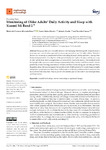Monitoring of older adults’ daily activity and sleep with Xiaomi Mi Band 2

View/
Use this link to cite
http://hdl.handle.net/2183/28959Collections
- Investigación (FCS) [1295]
Metadata
Show full item recordTitle
Monitoring of older adults’ daily activity and sleep with Xiaomi Mi Band 2Date
2021-10-27Citation
Mirada-Duro MC, Nieto-Riveiro L, Groba B, Canosa N. Monitoring of older adults’ daily activity and sleep with Xiaomi Mi Band 2. En: de Moura J, González MA, Pereira J, Penedo MG, editors. The 4th XoveTIC Conference: A Coruña, Spain, 7-8 October 2021. A Coruña: Centro de Investigación en Tecnologías de la Información y las Comunicaciones (CITIC); 2021. (Engineering Proceedings, vol 7)
Abstract
[Abstract] Nowadays, the use of wearable devices is still emerging. Monitoring with wearable sensors is an easy and non-intrusive approach to encourage preventive care for older adults. Wearable devices are becoming an assessment tool for evaluating physical activity and sleep, among other biomedical parameters. The objective of the present study is to explore the daily activity and sleep of older adults from three nursing homes, as measured by Xiaomi Mi Band 2. The results showed that people with a greater number of steps (representing daily activity) could be related to a lower probability of risk of falling, dependency on basic activities of daily living, and mobility problems. Regarding sleep, the results suggest that people at risk of falling tend to be awake longer at night. Independent people get more deep sleep, while people who identify problems in their usual activities have a lower total sleep time. Finally, people who identify pain or discomfort have less light sleep and sleep in total.
Keywords
Wereable technology
Remote monitoring
Occupational therapy
Remote monitoring
Occupational therapy
Description
Proceeding paper
Editor version
Rights
Atribución 3.0 España
ISSN
2673-4591






